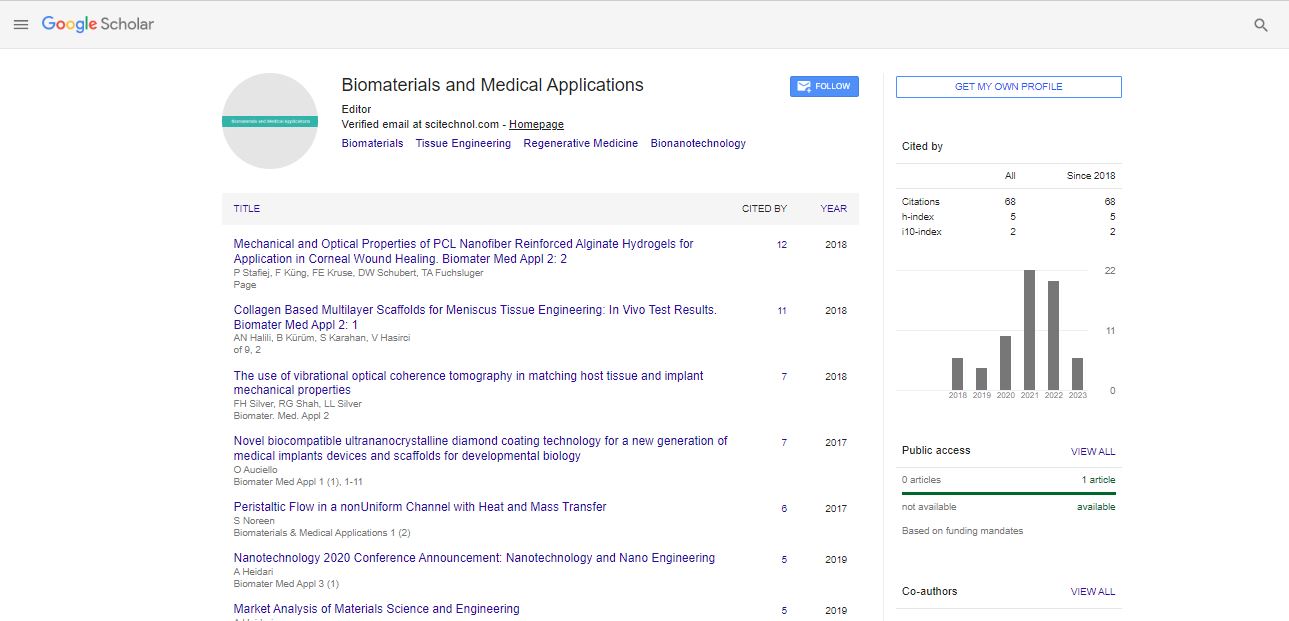Three-dimensional printed medical devices: An EU MDR regulatory overview
Ashish Indani
Tata Consultancy Services, India
: Biomater Med Appl
Abstract
Addative manufacturing or 3D printing of medical devices has set a new miles-stone in the personalized medicine. The major approach change is about no requirement for any additional equipment or manufacturing set-up. Its flexibility is benevolent for designers who can make devices with complex internal structures or implement design changes at an ease. The 3 D printing technique is majorly used in manufacturing patient-specific or personalized medical devices like implants or external prostheses. These devices are made to fit or mimic a person’s anatomy even in extremely complex structures. Additionally, the 3D printing technique is uses for manufacturing instruments or equipment. There are sustained efforts to identify the opportunity for development of live organs using 3D printing technology. While the 3D printing technology is broadening its horizons, several challenges in managing ethics and regulations of the devices have started popping up. The devices are actively being used in the patients for about 3 years and malfunctions complaints are observed being reported about these devices. As the responsibility of ethics and regulation are with the manufacturers of the medical devices, the challenge in traditional medical devices are more manageable than that of the 3D printed devices, where there is no licensed manufacturer. The 3 D printed and custom devices especially from the human tissues are intended to be manufactured at the point of care yet, treating doctors or the institute cannot be called manufacturers. Hence, it is difficult to identify the correct and responsible persons. This issue needs to be addressed before it becomes severe and its takes a shape in terms of ethical threat or a regulatory problem. US FDA has issued several documents clarifying its role in regulating 3D printing and addative manufacturing technology in medical devices, e.g. 3Rs of 3D Printing: FDA's Role . We are herewith discussing the probable regulatory clauses in MDR 2017 that can be for the 3D printed devices. Even if there are no specific mentions of 3D printed devices in the regulations, there are regulations about custom made devices which are defined in article 2, point 3, which points mainly to the devices produced at the point of care. Hence, in the clause 4 of article 10, the manufacturer of custom-made devices are excluded from the obligation of maintaining a design dossier but need to maintain a draw-up. The manufacturer of such custom-made devices are required to demonstrate requisite expertise and at least 2 years qualifications.
Biography
Ashish Indani is a qualified physician with an MBA in Clinical Trial Management and MIRCS (Research Methodology). With a vast experience of more than 18 years in the Domain of Clinical Research, Dr Ashish is an expert on Medical Devices Dr. Ashish has an extensive experience in strategizing, planning and executing global clinical trials in the field of Medical Devices during his association with Meril Life Sciences (Head of Clinical Research), Genelife Clinical Research (Head of Clinical Operations), Invent BioMed (Medical and Research Director) and Biosensors International (Senior Manager Clinical Research). He has authored more than 125 publications and books on diverse subjects primarily medical devices, clinical research methodology, different therapeutic areas and ancient Indian Vedic literature. In his current role as a domain consultant at Tata Consultancy Services, Dr. Ashish is working with the platforms team for the development of innovative technology solutions with use of Artificial Intelligence (AI), Internet of Things, Blockchain etc. across various Life-Sciences operations (especially medical devices). He is working to support the development and implementation of many modern technologies such as IOT and Blockchain in Life-Sciences. He also oversees the medical devices service offering within Life Sciences.
E-mail: ashish.indani@tcs.com
 Spanish
Spanish  Chinese
Chinese  Russian
Russian  German
German  French
French  Japanese
Japanese  Portuguese
Portuguese  Hindi
Hindi 